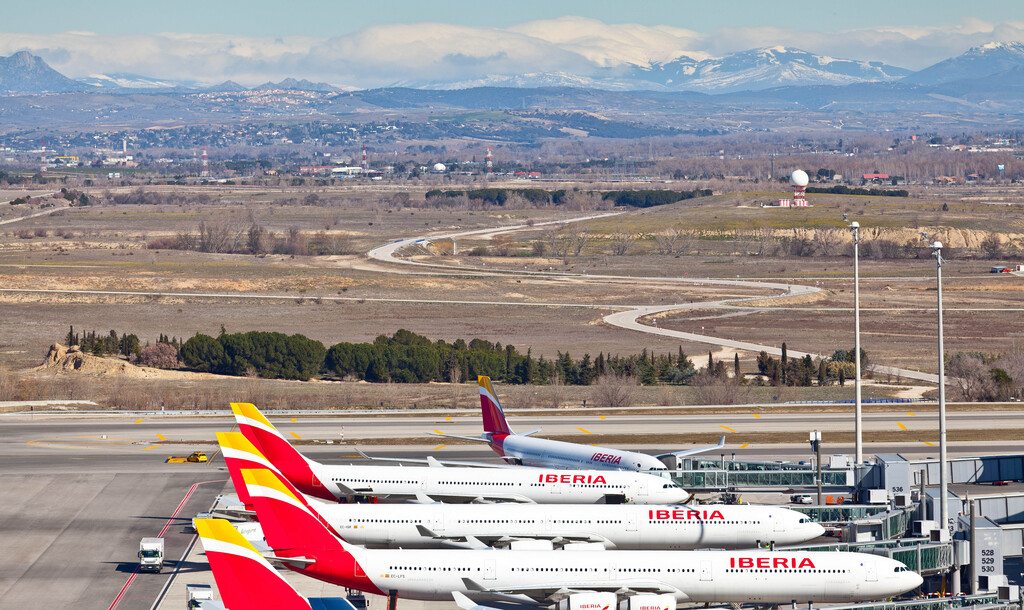Source: Iberia
- The airline launched a new generation of Airbus A350 aircraft offering a huge increase in quality in its Business, Premium Economy, and Economy cabins
- It recovered its entire network of destinations and, in the first quarter of next year, it will deploy 105% capacity over that of 2019, with a focus on Latin America and the United States
- By establishing Collective Agreements and transforming around 2,000 temporary contracts to permanent, Iberia reinforces its strategy to promote its internal talent
- Thanks to the results up to September, Iberia is expected to return to profit in 2022
- The biggest milestone in Iberia’s sustainability strategy is the agreement for the purchase, starting in 2028, of 110,000 tonnes of sustainably aviation fuel per year for five years
For Iberia, 2022 is the year in which it consolidated its recovery: it rebuilt its entire network of destinations, it resumed its fleet renewal plan, and is expected to return to profit.
13 Aircraft, a Qualitative Leap in Business and Maximum Punctuality
Iberia will welcome 2023 by debuting new Business, Premium Economy, and Economy cabins, in the two latest new-generation A350s to join its fleet this December.
All in all, in 2022 the airline has taken delivery of13 new aircraft, seven A350s -the last four with the new Airbus standard, which Iberia has launched – and six A320neo for short and medium-haul routes.
With this new product and the punctuality standards achieved in 2022, which placed it as the best airline in Europe for six consecutive months, Iberia is working on its aim of becoming the preferred option for its customers, the first pillar of its strategic plan -Next Chapter- for the next two years.
In addition, last June Iberia debuted new uniforms, revamped its in-flight meals, significantly improved its in-flight entertainment system with more options, and extended free Wi-Fi access for messaging to its entire fleet.
Focusing on Madrid… And the Americas
In 2022, Iberia recovered the entire network of destinations it had in 2019 and was close to reaching the capacity figures it registered at that time, deploying 95% of its 2019 capacity in the fourth quarter, with the prospect of starting 2023 with a capacity that is five percentage points above it.
Another of Iberia’s key aims was to reinforce its hub at the Madrid airport, in order to be able to compete against other main European hubs.
This year Iberia launched an intense campaign in the United States, opening its Dallas and Washington DC routes, and it now offers eight destinations there (New York, Miami, Boston, Los Angeles, and Chicago, to which it added San Francisco, Dallas and Washington DC during the Summer season). The airline offers 120 weekly flights between Spain and the US, and this winter it deployed 15% more capacity in this market than before the pandemic.
Latin America has been Iberia’s other big focus in 2022 and it will be even more so in 2023. Following the recovery of the routes to Caracas and Rio de Janeiro, it offers 18 destinations in 16 countries, with about 260 weekly flights, a figure that is expected to continue growing in the coming months. Iberia’s most relevant growth in this market has been in Mexico (up to three daily flights) and Colombia (where it will increase from two daily flights to 18 weekly frequencies and, progressively, up to three daily flights). These two countries, along with Peru (where it will go from seven to ten weekly flights, with the aim of reaching two daily flights), and Argentina will be the focus of Iberia’s work in 2023. The airline already offers daily flights to all of Central America, continues growing in the Caribbean and is increasing its capacities in other countries, such as Ecuador and Uruguay.
Agreements With All Groups in Record Time
Despite a particularly harsh context due to the impact of inflation and turmoil in many sectors, Iberia managed to finalise three collective agreements with its employees (ground staff, pilots, and PCC) in just three months, contributing to social well-being for the next three years, which will allow the airline to focus on its growth plans.
Additionally, in 2022 Iberia transformed the contracts of 1,692 employees of the Airports Department into permanent discontinuous workers, while more than 300 PCC contracts became permanent discontinuous.
This year, 52 pilots joined Iberia, coming from its Cadet program and from the job advertisement published by the airline in June.
Regarding staff, it is also worth noting an ambitious training plan entitled “Everything starts with me”, which aims to improve customer service and which has already been taken by more than 4,000 employees, crew members, airport agents and call centre workers. The airline has also resumed various initiatives related to diversity, flexibility, and recognition.
A Return to Profit
In the third quarter of the year, the airline obtained a positive result of €246 million, and this good dynamic is expected to continue in the fourth quarter, which would allow the airline to announce positive results for the whole of 2022, with its three businesses (airline, handling, and maintenance) showing profits.
The Future, With a Social Focus
In 2022 Iberia also made significant progress with its sustainability strategy.
To the agreement that it has maintained with REPSOL since 2021, it added another with CEPSA to promote the production of sustainably sourced fuel, in sufficient quantity and at a reasonable price.
Together with REPSOL, in June Iberia operated the first long-haul flights using sustainable biofuel produced in Spain; specifically to Washington DC, Dallas and San Francisco.
Additionally, Iberia has already closed its first agreement with the company Gevo for the purchase of 111,700 tonnes of SAF over 5 years.
Lastly, the airline launched two carbon offset programmesfor its customers and companies.

